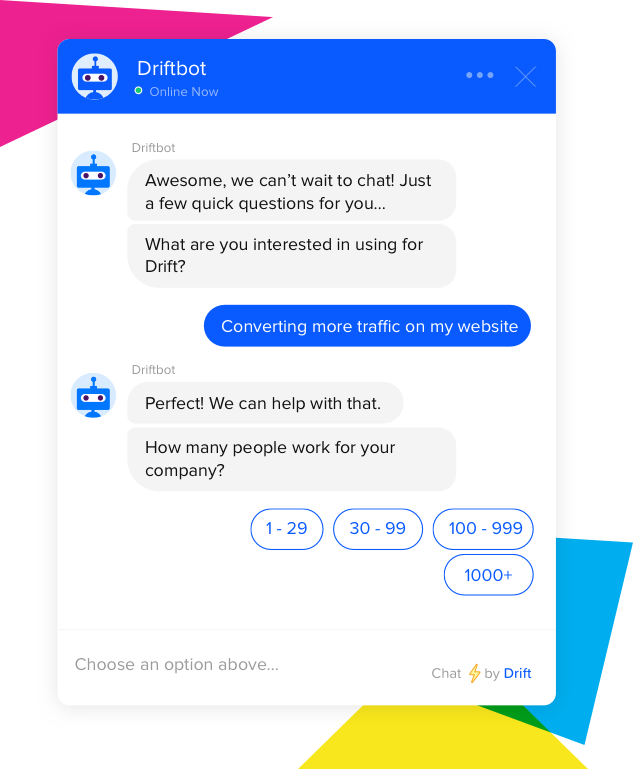Drift vs. Zendesk Answer Bot: Which One Does My Site Need?
I was recently certified in Drift Conversational Marketing and found that a lot of customers had questions about Drift vs. Zendesk – two of the most popular support software options on the market today.
Namely, what Drift and Zendesk are, whether you can use both at once, and the main differences between them. So, to answer these questions and make it easier on anyone researching the topic, I decided to create a quick cheat sheet — or blog post — about this very topic.
What is Drift?
Drift is a conversational marketing chatbot that meets potential customers where they are at in the buying journey. According to a recent Forrester study, the modern customer has completed 68% of their research independently online, before ever talking to someone on your sales team. They expect to be able to engage and buy on their terms and timeline. Furthermore, they want a buying experience that caters to their needs. Drift’s chatbot technology functionally puts customers first by conducting human-like conversations to align website visitors with what they need and route them quickly to the right person on your team.
So how does it work? First and foremost, Drift is a chatbot that lives on your website. It’s a conversational tool that is designed to match your website visitors with relevant content, identify intent, and convert conversations into sales. Each conversation begins with a play that focuses on what page they are visiting, who they are, where did they come from, and why they are visiting your website.
For example, if somebody visits your product comparison page, your bot can initiate a conversation by engaging them with a strong opener, understanding why they are visiting this page, and then recommending a next step. The recommendation may be something simple, like downloading a useful e-book (your chatbot can automate then send off content). The information collected can then be used to nurture this potential customer further. Perhaps they are ready to talk to someone in sales? Your bot can schedule meetings for your salespeople.
One of the most appealing features of Drift is its ability to work after hours — it is, after all, a bot and not a real person. A lot of other bots will only operate during business hours. Outside of those hours it will disappear from the website. But Drift works 24/7 and can schedule meetings while you sleep. It’s also great at having conversations with people thanks to its ability to capture the human element and artificial intelligence that helps it learn from experience. This makes it easy to set up plays, provide information and resources based on where the customer is on the website, and easily book meetings. You can meet customers halfway, no matter where they are in their buying journey, while also eliminating barriers to help potential customers make a purchase.
Can Our Customer Support Team Utilize Drift?
Not all visitors to your website are there to buy. Often, your current clients are stopping by to look for support. Drift bots have many helpful skills that help automate support processes.
If you already use Zendesk, Help Scout, HelpDocs, etc. for your Customer Support platform, Drift can integrate directly to scan your help articles for useful answers to their questions. When self-service is insufficient, Drift bots can create tickets and connect site visitors to an agent.
What is Zendesk?
So, what is Zendesk Answer Bot, and how does it differ from Drift? As previously stated, Zendesk can integrate with Drift. This is not a “Sophie’s Choice” situation where you must choose between one or the other.
To begin, I’ll provide a quick overview of the platform. Zendesk is an omnichannel customer experience platform that provides a centralized hub for support activities from every place your customers contact you at (email, webforms, phone, web chat, social, ect).
As you can see, there are three main sections. On the left, you have customer information. Depending on how your system is designed, you may have different fields, but this is generally how it will appear. You’ll see an overview (in this case it’s a General issue) and additional details, like the order number (#1002). In the middle section, we will see the ticket. Here, the customer is looking for the status of her order, which is relatively straightforward. But the inquiries can range from simple solutions — like pulling tracking and fulfillment information from e-commerce platforms like Shopify or Magento — to answering complex questions about specific products or software. Finally, on the right-hand side, you’ll find the various integrated apps, like Shopify in this example. However, it doesn’t just have to be an e-commerce platform or app. CRMs, onboarding processes, or time tracking, can also integrate.
Zendesk Answer Bot is an AI powered support bot that works as a personal assistant to your support teams. It assists website or help center visitors by finding answers to their questions in your Guide articles before they are ever connected to an agent. Answer Bot is also multilingual and works across channels to help your customers self-service.
Ticketing
Phone calls, chat, email, a contact form, or social media inquiries all create Zendesk tickets. Pretty helpful if, say, you run an e-commerce site that markets and sells on all major social media platforms. These types of sites usually have thousands of inquiries each day from various purchasing platforms. Zendesk is a great way to manage them.
Answer Bot can function by providing self-service on your website. It responds to customers immediately and leverages your Guide knowledge base to curate answers to your customers questions. Plus, it’s powered by AI so it learns from its mistakes and makes better suggestions over time. If it is unable to assist, then it quickly creates a ticket and connects to a live chat for an agent to assist.
Your agents will love Answer Bot because it frees up their time by deflecting easy-to-answer questions and it’s extremely easy to implement with 73% of early adopters agreeing that Answer Bot was easy to startup.
The main differences between Drift and Zendesk
The most important difference between Drift vs. Zendesk Answer Bot is the fact that Drift is designed for sales conversations and marketing conversions, while Answer Bot is designed for assisting your current customers with self-service.
Drift captures the human element of conversation with Artificial Intelligence and playbooks that you write. Answer Bot does not work through plays, which means it is quick to implement, but it is most helpful when it has a robust knowledge base to search through.
Drift has a longer onboarding period and requires a sound marketing strategy to implement.
Help! Which bot do I need?
If your priority in adding a chatbot is to convert more websites visits into buying conversations, Drift is a no-brainer. It can do what Zendesk Answer Bot does, but with all the tools to create an awesome buying experience from your website.
If you are interested in beefing up your Zendesk Guide with a bot that can quickly return relevant results from your knowledge base, Zendesk Answer Bot is a proven way to help customers self-service quickly.
—
Customer support is a must have, no matter the industry. But figuring out which software is the right one for you can be tricky. Luckily, we’re experts in the field, and you can feel free to email us at [email protected] for a free consultation, to speak with an expert, or to get a demo of either of these pieces of software.
Want to see Zendesk in action? Start a free trial or watch our webinar Transforming Customer Experience with Zendesk for a more in-depth look into how Zendesk works.

Related Post
Stay in the Loop
Subscribe to get all our latest content sent directly to your inbox!


